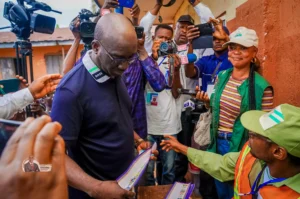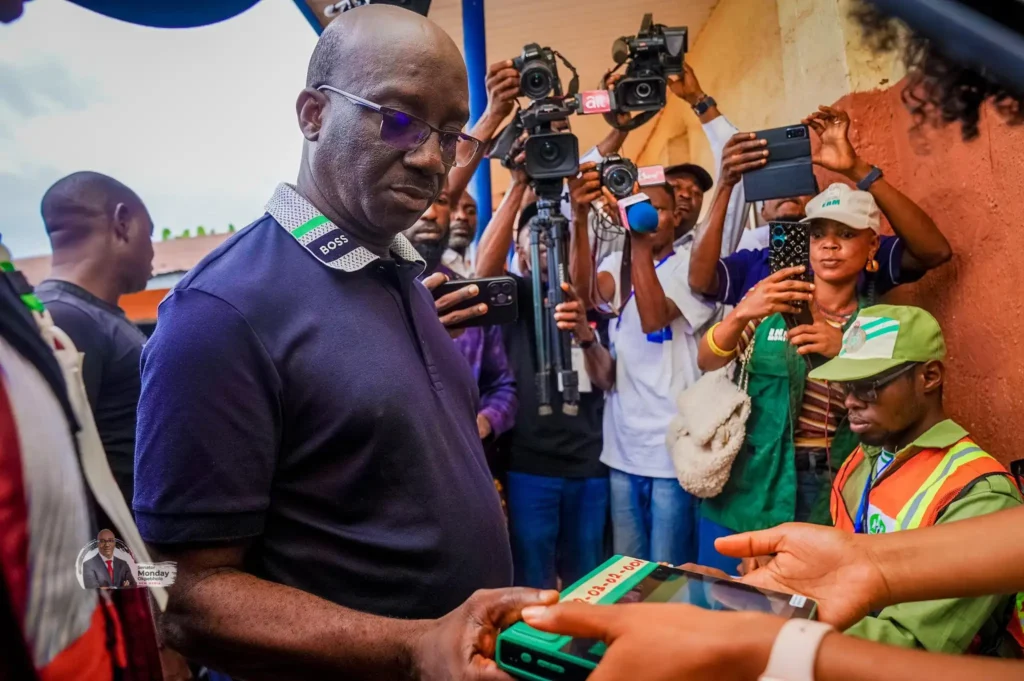The All Progressives Congress (APC) achieved major political victories in both Edo and Ondo States during the 2024 off-cycle elections, capitalizing on internal divisions within opposition parties. These wins underscored APC’s expanding influence and the strategic advantage gained from a fractured opposition.
In Edo State, the APC candidate, Monday Okpebholo, triumphed over the People’s Democratic Party (PDP) nominee, Asue Ighodalo, marking a significant shift in power. This win came after years of PDP control, signaling voter dissatisfaction and weakened unity within the PDP. Political analysts attribute the loss largely to infighting and disunity in the party’s state structure, which created a path for APC to reclaim dominance in the region.

Similarly, in Ondo State, APC Governor Lucky Aiyedatiwa won a resounding re-election, defeating PDP’s Agboola Ajayi by a wide margin. The APC not only maintained the governorship but had already swept 22 out of 26 seats in the state assembly elections earlier in 2023. The PDP, hampered by internal rifts and lack of a unified strategy, failed to pose a significant challenge in either race.
PDP Retains Grip on Bayelsa
In contrast, the PDP managed to hold its ground in Bayelsa State, where incumbent Governor Douye Diri secured a second term in office. Diri defeated APC challenger Timipre Sylva by a substantial margin, winning six out of the state’s eight local government areas.
The Bayelsa contest demonstrated the PDP’s ability to maintain voter loyalty in its strongholds, particularly when internal cohesion remains intact. Despite legal challenges from the opposition, the courts later affirmed Diri’s victory, further strengthening his position and the party’s foothold in the South-South region.
Opposition Disunity Shapes Electoral Outcomes
The contrasting results from these gubernatorial elections highlight a broader trend in Nigerian politics: the detrimental effect of opposition disunity. In Edo and Ondo, the failure of the PDP and other opposition groups to coordinate effectively or present a united front played into the hands of the ruling party. Meanwhile, the Bayelsa result showed how opposition parties can still win when they are well-organized and present a clear, unified message to voters.
Political observers note that the rise of smaller parties, such as the Labour Party, has also contributed to vote splitting, particularly in the South. This fragmentation continues to weaken the opposition’s ability to compete effectively against the APC on a national scale.
Looking Ahead to 2027
As Nigeria moves toward the 2027 general elections, these state-level contests offer valuable insights. The APC has demonstrated its ability to capitalize on a disjointed opposition, while the PDP’s victory in Bayelsa shows that strong internal structure and clear leadership still resonate with voters.
The challenge for Nigeria’s opposition parties moving forward will be to overcome internal conflicts, build coalitions, and present a credible alternative to the APC’s dominance. Without such reforms, further electoral losses may be inevitable.







